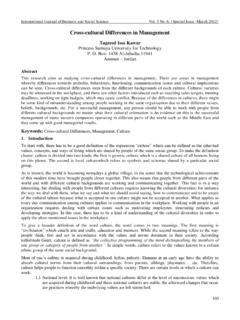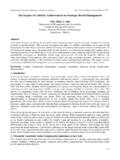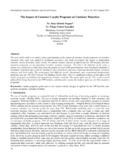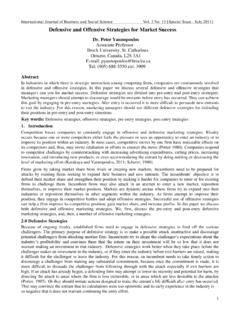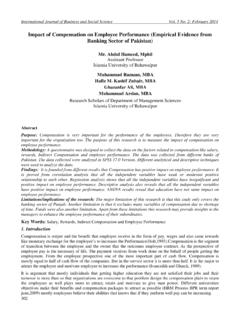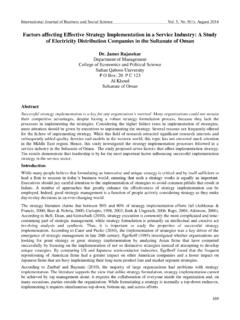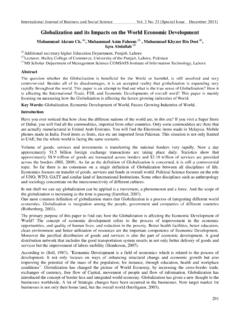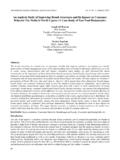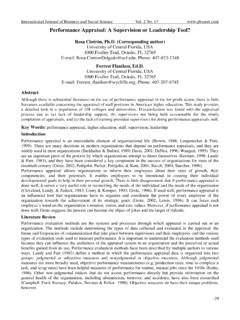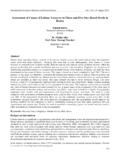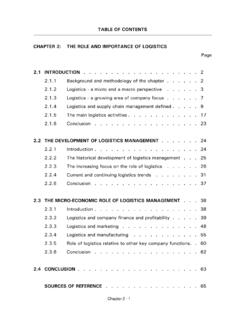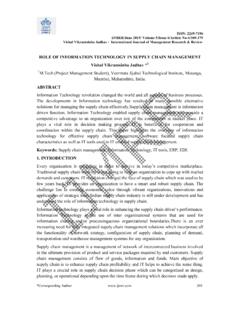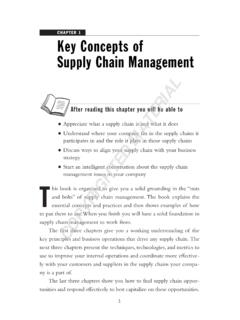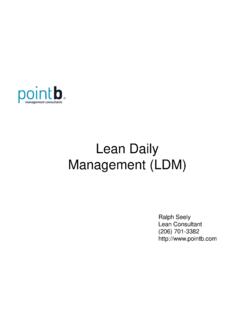Transcription of A STUDY OF SUPPLY CHAIN MANAGEMENT PRACTICES: AN …
1 International Journal of Business and Social Science Vol. 2 No. 17 166 A STUDY OF SUPPLY CHAIN MANAGEMENT PRACTICES: AN EMPIRICAL INVESTIGATION ON CONSUMER GOODS INDUSTRY IN MALAYSIA. Sukati Prof. Dr. Abu Bakar Abdul Hamid Assoc. Prof. Dr. Rohaizat Baharun Dr. Huam Hon Tat Faculty of MANAGEMENT and Human Resource Development Universiti Teknologi Malaysia E-mail: Fazila Said Malaysia Nuclear Agency Malaysia ABSTRACT The purpose of this research is to present the relationship between SUPPLY CHAIN MANAGEMENT (SCM) practices and SUPPLY CHAIN responsiveness (SCR), and investigates its relationship with competitive advantage (CA). The data collection instrument used was a questionnaire which was administrated to a total sample of 200 managers.
2 The response rate was 70% while 60% was usable questionnaires. Sample selection was based on convenience sampling. The analyses involved statistical methods such as reliability and validity tests and multiple regressions. The results indicated that SCM practices are related to SCR. The result also suggested that SCR is related to CA. 1. Introduction In today s competitive business there is an increased focus on delivering value to the customer. The focus on attention of most of businesses is providing products and services that are more valuable compared to its competitors. Concurrent to the focus on customer value, the marketplace in which businesses operate today is widely recognized as being complex and turbulent (Christopher, 2000; Goldman et al.)
3 , 1995). The growth of SUPPLY CHAIN aims to improve profitability, customer response and ability to deliver value to the customers and also to improve the interconnection and interdependence among firms. Due to market expanding from domestic market to global market increase customer demands, for instance demanding lower prices, faster delivery, higher quality products or services and increase the variety of items (Braunscheidel, 2005). According to Towil and Christopher, (cited in Thatte, 2007), the end customer in the marketplace today determined by the success of failure of SUPPLY chains MANAGEMENT practices. They stated that getting the right product, at the right price, at the right time to the customer is not only improved competitive success but also the key to survival.
4 Many previous researches explored the importance of integrating suppliers, manufacturers, and customers or SUPPLY CHAIN integration (Frohlich and Westbrook, 2001; Clinton and Closs, 1997) ( SUPPLY CHAIN MANAGEMENT ) so as to obtain flexibility and speed. By addressing SUPPLY CHAIN MANAGEMENT practices that contribute to SUPPLY CHAIN responsiveness, will help the researcher better understand the scope and activities related to SUPPLY CHAIN MANAGEMENT that create enhanced level of SUPPLY CHAIN responsiveness in competitive business marketplace. The purpose of this STUDY to find out the effect of SUPPLY CHAIN MANAGEMENT practices such as strategic supplier partnership, customer relationship, information sharing and SUPPLY CHAIN responsiveness.
5 This STUDY also investigates the effect of SUPPLY CHAIN responsiveness in term of operation system responsiveness, logistic process responsiveness, supplier network responsiveness and competitive advantage of the firm. The paper is organized as follows. Relevant literature is reviewed and synthesized first to develop a conceptual model, followed by research methodology. The results are then presented along with discussion. Conclusion and implication are discussed finally. 2. Literature Review and Hypotheses The research objectives in this STUDY were designed to investigate the effect of SUPPLY CHAIN MANAGEMENT practices in terms of strategic supplier partnership, customer relationship, and information sharing on SUPPLY CHAIN responsiveness and to determine whether SUPPLY CHAIN responsiveness has impact on competitive advantage of the firm.
6 Within these objectives, there are three concepts that needed to be explored, to obtain an understanding of these objectives. These concepts are reviewed both supplier and customer (externally) and internally. The Special Issue on Contemporary Issues in Business Studies Centre for Promoting Ideas, USA 167 These concepts are (1) SUPPLY CHAIN MANAGEMENT practices that encompasses supplier partnership, customer relationship and information sharing, (2) SUPPLY CHAIN responsiveness that includes operation system responsiveness, logistic process responsiveness, and supplier network responsiveness, (3) competitive advantage of the firm.
7 SUPPLY CHAIN MANAGEMENT practices as a multi-dimensional construct that encompasses upstream and downstream sides of SUPPLY CHAIN (Li et al, 2006). Donlon (1996) stated that outsourcing, supplier partnership, information sharing, cycle time, compression and continuous process flow, as a part of SUPPLY CHAIN MANAGEMENT practices. While Tan et al (1998) represented SUPPLY CHAIN MANAGEMENT practices in form of quality, purchasing, and customer relationship. Alvarado and Kotzab, in their empirical STUDY focused on SUPPLY CHAIN MANAGEMENT practices on inter-organizational system used, core competences, and elimination of excess in inventory through postponement. The key aspect of SUPPLY CHAIN MANAGEMENT practices according to Tan et al (2002) were SUPPLY CHAIN integration, information sharing, customer service MANAGEMENT , geographic proximity, and JIT capabilities.
8 Lee (2004) focused on five practices at SUPPLY CHAIN level that are a key to create SUPPLY CHAIN responsiveness. They includes outsourcing, strategic supplier partnerships, customer relationship, information sharing, and product modularity. Chen and Paulraj (2004) also conduct the research regarding SUPPLY CHAIN MANAGEMENT practices, they investigated long-term relationship, cross-functional teams, supplier base reduction, and supplier involvement. The same with Chen and Paulraj, Min and Mentzer (2004) also examined in their STUDY long-term relationship, information sharing, cooperation process integration and SUPPLY CHAIN leadership underlying the SUPPLY CHAIN MANAGEMENT practices.
9 Lie et al (2005,2006); Thatte (2007) identified SUPPLY CHAIN MANAGEMENT practices in form of strategic supplier partnership, customer relationship, and information sharing. This research adopts the same SUPPLY CHAIN MANAGEMENT practices (supplier partnership, customer relationship and information sharing). However, this STUDY conducted in Malaysia perspective, especially in consumer goods industry. Li et al (2005); Thatte (2007) have developed a valid and reliable instrument to measure SUPPLY CHAIN MANAGEMENT practices. The similar instrument also adopted in this research. The literature also depicts SUPPLY CHAIN MANAGEMENT practices from different perspectives with goal of improving competitive advantage of firm.
10 By improving competitive advantage of the firm, organization could improve its performance. Three dimensions of SUPPLY CHAIN MANAGEMENT practices lead to SUPPLY CHAIN responsiveness. These are strategic supplier partnership, customer relationship, and information sharing also identified. A SUPPLY CHAIN is a network of organizations to perform a variety of processes and activities to generate value in the form of products and services to end consumers. (Christopher, 1992). SCM involves an integrated and process-oriented approach to the MANAGEMENT , design and control of the SUPPLY CHAIN , with the aim of producing value for the end consumer, by both customer service and reduce cost (Bowersox and Closs, 1996; Giannoccaro and Pontrandolfo, 2002).
